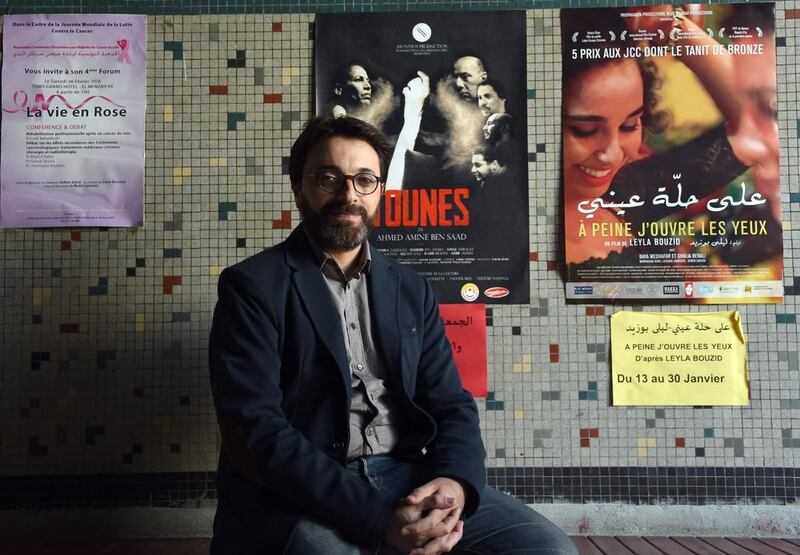Tunisia is having something of a cinematic moment in the spotlight and Hedi – which was partly funded by Abu Dhabi's Sanad fund and had its world premiere in competition at the 66th Berlin Film Festival – is its latest shining star.
At first glance, the debut feature film from director Mohamed Ben Attia seems like a love story – in fact, it is a metaphor for the issues and problems Tunisia faced before, during and after the overthrow of former president Zine El Abidine Ben Ali in 2011.
The action takes place in the present day over the course of a single week. Hedi (Majd Mastoura) is a car salesman who drifts aimlessly in life and does not seem overly excited that he is about to marry Khedija (Omnia Ben Ghali). The marriage was arranged by his domineering mother, Baya (Sabah Bouzouita), a widow who organises everything for her son, who does what he is told without protest.
Sent to find new business in the coastal city of Mahdia, Hedi meets Rim (Rym Ben Messaoud), a free spirit who arranges activities for tourists. Hedi is drawn to her sense of freedom and shares with her his dreams of becoming a graphic artist. They begin an affair but he does not tell her that he is engaged.
The encounter forces Hedi to re-examine and consider taking control of his life – but to do so, he has to find the courage to confront his mother and free himself from tradition.
“I wanted the film to work on two levels,” says Ben Attia. “The first reading, for those unaware about the history of Tunisia, is that it is the story of someone who is lethargic, who is confronted by the expectations of his family.
“He meets this girl, then he wants to be emancipated from the social code that his family imposes. That is the reading of the film for those who cannot see the subtext.”
Nonetheless, Ben Attia hopes that Tunisians, and those with knowledge of events in the Arab world, will see the film’s more subtle allegories and metaphors.
“I made this film in the first instance for a Tunisian audience,” he says. “I want to say something about the situation there.
“I also believe that by looking at something on a micro level, you are able to talk to the audience on a more universal scale.”
His approach seems to be working, as the film received rave reviews at the Berlin festival, which ended on Friday, with Variety describing it "an adept and absorbing drama".
The film surprises because Hedi never loses his melancholy, despite the liberation he begins to feel. Ben Attia says that he sees Hedi’s state of being, and his failure to find true happiness, as a reflection of the situation in which Tunisia has found itself after the overthrow of Ben Ali.
“My country is hungover,” he says. “It’s no longer gagged but in the throes of deep social, religious and economic crisis.
“I know that it is a cynical assessment but it’s a reality that we cannot ignore.” The film was co-produced by acclaimed Belgian filmmakers, The Dardenne Brothers. Ben Attia’s producer, Dora Bouchoucha – who founded the Carthage Film Festival Projects workshop in 1992 and helped Ben Attia develop five short films – suggested that he approach the two-time Cannes Palme d’Or winners because she saw parallels between their work and his.
“We thought that they were a good match, because we also like small stories that are a front for a much bigger story, which is like the work that they do,” says Ben Attia.
They also received funding from Sanad, the development and post-production fund of Abu Dhabi’s twofour54.
“I don’t know too much about the financial side of the film, so my knowledge is limited,” admits Ben Attia. “But, my producer, Dora, she sent the script to them and they agreed to provide some finance, and it was a great pleasure for us to have Sanad in the film.”
Ben Attia’s journey to the world of films was an unusual one. He worked as a door-to-door salesman in Tunisia, which seems to echo the story of Hedi’s title character. But he is quick to point out that any similarities are minor.
“I don’t have much in common with Hedi,” he says. “My family is different. The thing that we have in common is that I know the work of a salesman very well. That is a character I know, because that character can have a personality like he is a ghost.”
That said, like the main character in his film, Ben Attia has proved that it is never too late to pursue your dreams, having made his first feature film at the age of 40. Now that he has sampled the glamour of the red carpet in Berlin, he has a taste for the filmmaking business.
“I’m already writing my next script,” he says. “I’m 40, so I understand that I have to be quick to write now. Hedi took a long time, from the script stage to financing it, and I hope the next one is quicker.”
artslife@thenational.ae






